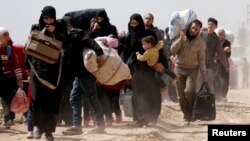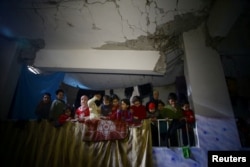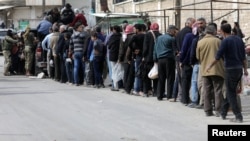U.N. agencies are calling for the protection and safety of tens of thousands of Syrian civilians fleeing from fierce fighting in eastern Ghouta, a suburb of the capital Damascus, and Afrin, a Kurdish enclave in northern Syria.
Eastern Ghouta is under relentless air and ground attacks from forces loyal to Syrian President Bashar al-Assad and his ally, Russia.
Aid agencies report up to 50,000 residents of eastern Ghouta have fled their homes in recent days. They say both the newly displaced and the hundreds of thousands of civilians still trapped in the besieged suburb are in urgent need of humanitarian assistance.
The U.N. refugee agency says it is not involved with the current evacuation, but spokesman Andrej Mahecic said the UNHCR and other agencies are at makeshift collective shelters ready to deliver aid.
“People left with nothing. So, they need essentially everything from clothing to shelter and many of them are actually sleeping out in the open. Some of the schools have been turned into improvised collective shelters. There is not enough room. These are congested. So, as I was mentioning, many people do sleep out, rough under the stars in the open. And any assistance that can be provided to them right now is, in a way life-saving,” Mahecic said.
Aid workers say people arrive at the collective centers weak, frail and hungry. Those who have entered eastern Ghouta with aid convoys describe the children as being emaciated and stunted in their growth.
They say the children who have spent their days hiding in darkened basements have a variety of medical problems. Spokeswoman for the U.N. children’s fund, Marixie Mercado, said those who have managed to leave the city suffer from diarrhea, respiratory infections, scabies and lice.
She said the stories they have to tell are heartbreaking.
“A six-year-old boy described breakfast saying that some days, back in his village of Kafr Batna, they would not eat at all. A 12-year-old boy from Hamourieh is being treated for wounds sustained when a shell hit their home the day before they evacuated. Mohammed, 12 days old, has seen and felt the sun for the very first time,” Mercado said.
Jens Laerke, spokesman for the Office for the Coordination of Humanitarian Affairs told VOA the U.N. is not monitoring the escape routes and has no control over what is happening.
“The exodus is operating - it is pretty chaotic, frankly as you have seen. There is ongoing bombardment. It is a war zone and people are fleeing in the tens of thousands out of east Ghouta. Now, once they get out of the actual hot combat zone, there are these shelter points … where the Syrian Arab Red Cross has access to them so that we can provide the relief that we have,” Laerke said.
One of the big problems holding up the humanitarian operation is a severe and chronic lack of money, according to officials.
Meanwhile, another emergency is unfolding in Syria’s northwestern Afrin region, where more than 100,000 people have been uprooted from their homes. Turkish forces are mercilessly pounding Kurdish fighters in Afrin, whom they accuse of being linked to the Kurdistan Workers’ Party, considered a terrorist group by Ankara.
UNICEF’s Mercado said her agency has not been able to deliver health and nutrition supplies to Afrin district for weeks and the delivery of much needed safe water has stopped because of the violence.
“UNICEF is responding to the immediate needs of about 20,000 families who have been displaced to villages surrounding [the town of] Afrin, but there are still an estimated 100,000 people, about half of whom are children, in Afrin district - and they too need urgent humanitarian assistance,” Mercado said.
Mercado added that UNICEF and other agencies are ready and able to provide aid, including medical items that are said to be in short supply, if assurances of safety can be given and kept.






